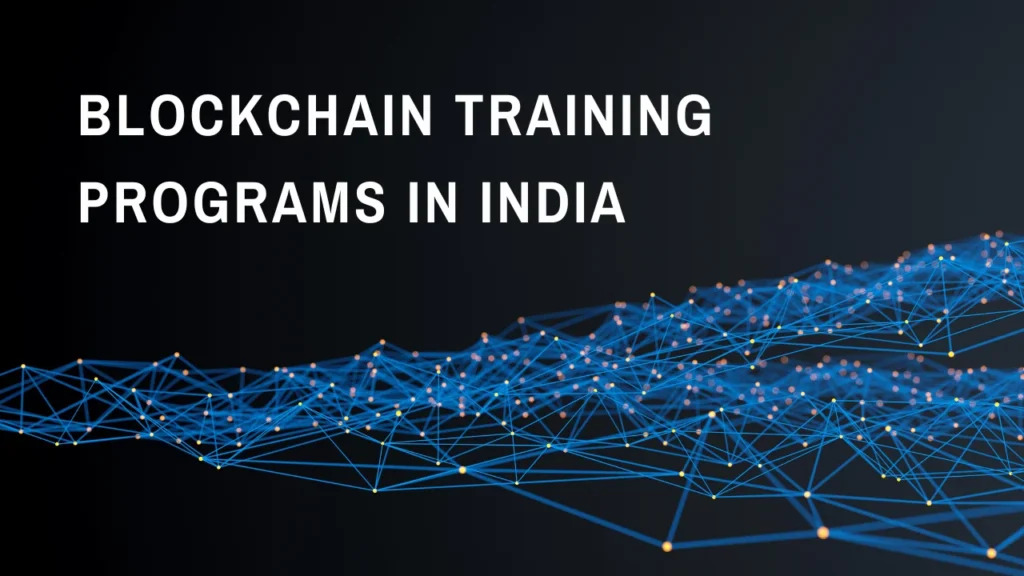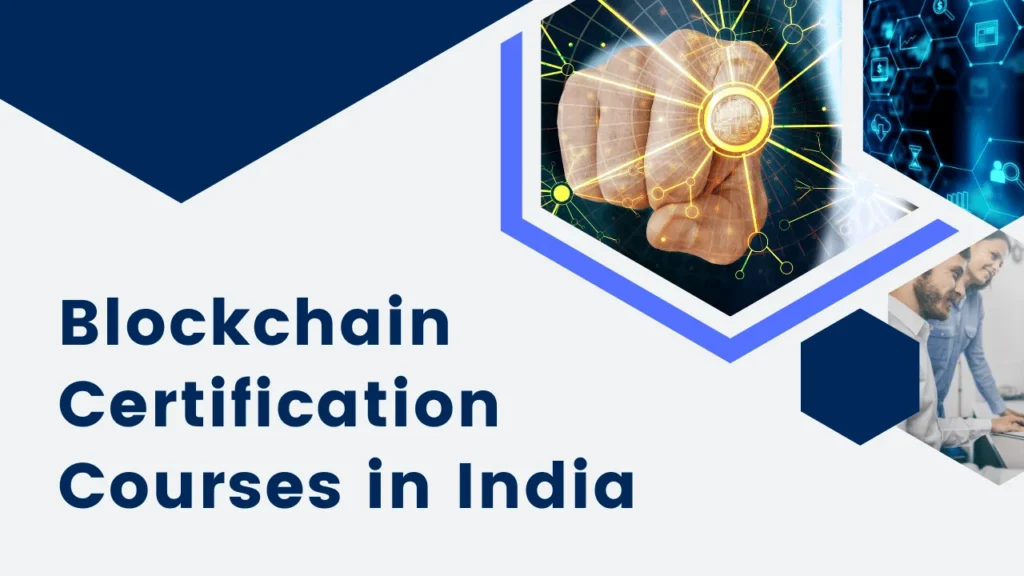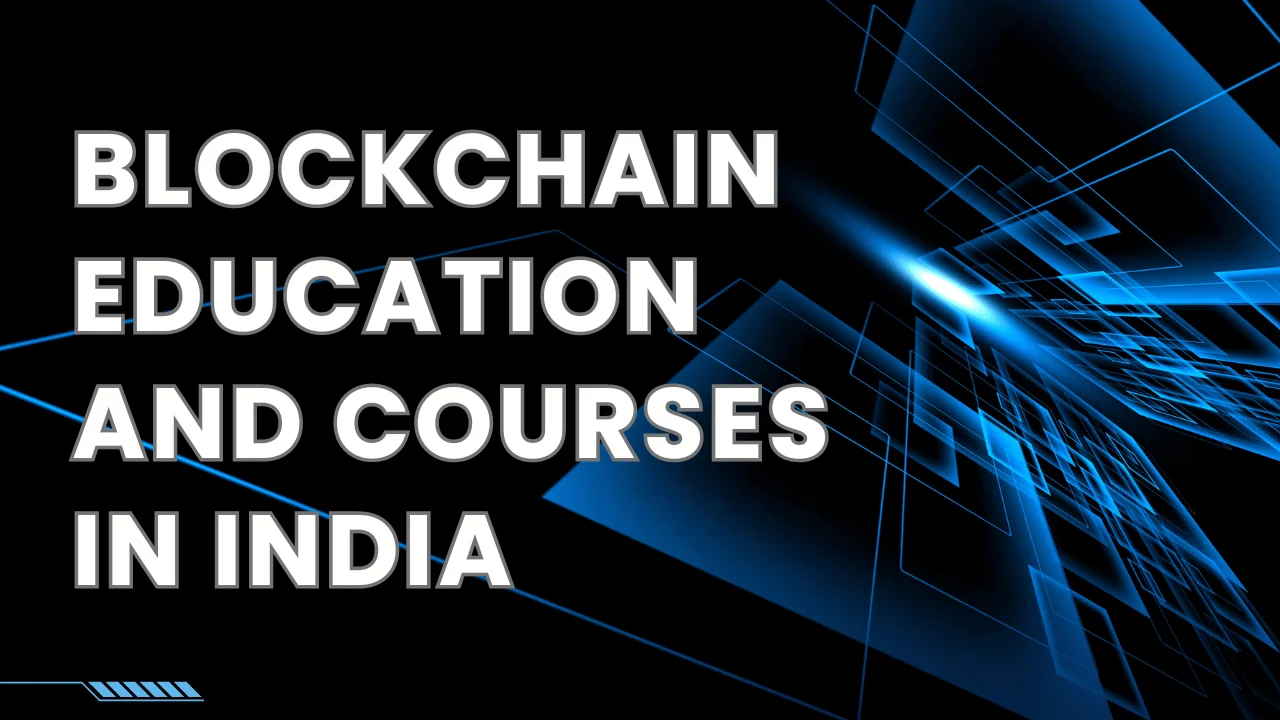In India, the landscape of education is evolving rapidly to meet the demands of emerging technologies. Blockchain Education and Courses in India have surged in popularity, driven by the recognition of blockchain’s transformative impact across various sectors. One of the most important innovations of the digital age, blockchain is changing business models all over the world, including in India. Ethereum isn’t the only industry that could benefit from blockchain technology’s efficiency, security, and transparency; healthcare, finance, and supply chain management are just a few more. A proliferation of blockchain-related courses and education has occurred in India as a result of this technology’s revolutionary potential. Edureka, Henry Harvin, and Simplilearn are at the forefront of this educational revolution; they offer courses covering all the major blockchain platforms, including Bitcoin, Ethereum, Hyperledger, and MultiChain. Anyone from software developers to project managers interested in learning how to use blockchain effectively will find something useful in these courses, which are carefully crafted to combine theory with practice.
Blockchain education in India aims to reach a wide range of people, from professionals to curious bystanders, all of whom are interested in learning more about the technology. Because of the technical expertise needed to succeed in blockchain development, these courses typically attract candidates with experience in object-oriented programming, networking, and Linux. These classes lay the groundwork for a variety of professions, such as architects, consultants, and blockchain developers, by teaching students how to design, build, and test blockchain networks.
Blockchain Training Programs in India

Blockchain education in India is known for its practical approach, which combines theoretical knowledge with hands-on experience. Here we take a look at blockchain training programmes from every angle, breaking down their format, content, and the skills they hope to instill in their participants.
Curriculum and Course Offerings
Courses in blockchain technology in India are structured to teach students both the theory and practice of the technology, with an emphasis on its practical applications. The creation and administration of private blockchains as well as smart contracts are the primary foci of these courses, which delve into prominent blockchain platforms such as Bitcoin and Ethereum. Students will learn all about blockchain technology, from its inner workings to its real-world applications in various industries, thanks to this all-encompassing method.
Hands-on Training and Projects
Students in blockchain courses in India get the opportunity to put what they’ve learned into practice through interactive, real-world exercises. Students can test out blockchain development, deployment, and management in these realistically simulated projects. Preparing students for the challenges of implementing blockchain technology in professional environments, such hands-on experience is priceless.
Expert Instructors and Industry Relevance
Expert instructors maintain the high standard of education in blockchain courses by bringing a plethora of knowledge and insight from the industry. Their input is crucial in keeping the curriculum up-to-date with the needs of the blockchain ecosystem, which in turn makes the course more engaging and useful for students looking for work. The value of blockchain education in India is greatly enhanced by this direct connection to industry experts and practices.
Certification and Career Advancement
Participants can demonstrate their competence and mastery of the blockchain industry by earning certifications upon course completion. Employers value these certifications and they can improve job opportunities. Certified professionals, whether they’re looking for a job as a blockchain developer, consultant, or architect, stand out from the competition because they have the skills and knowledge to use blockchain technology to drive innovation and efficiency.
Educational Platforms and Accessibility
Numerous resources, such as online classes, workshops, and intensive programmes, make blockchain education available in India. This adaptability makes blockchain education more accessible by accommodating a variety of learning styles and time constraints. Learners at all levels can discover courses that suit their needs and aspirations on platforms like Edureka, Henry Harvin, and Simplilearn, which offer a range of options from introductory courses to advanced training.
Blockchain Certification Courses in India

Obtaining a certification in blockchain technology demonstrates that you have mastered this cutting-edge field. Numerous educational establishments in India provide blockchain certification programmes that aim to teach students all they need to know to become successful in this industry.
Blockchain Developer Certification
This credential is for programmers who want to learn the ins and outs of blockchain technology, specifically how to build DApps and smart contracts. Those interested in learning how to make meaningful contributions to blockchain projects can benefit from the course’s comprehensive coverage of Ethereum and other blockchain platforms.
Blockchain Architect Certification
Individuals working in the field of blockchain solution design will find this certification particularly useful. Network architecture, security concerns, and consensus mechanisms are all covered in this architectural guide to blockchain technology. Graduates are ready to take the lead on blockchain projects, making sure they integrate well with current systems and are successfully implemented.
Blockchain Consultant Certification
The blockchain consultant credential is perfect for individuals who want to help companies implement blockchain technology. Focusing on strategic planning, identifying use cases, and evaluating blockchain platforms for different industry needs are key points. An organization’s operational efficiency and competitiveness can be enhanced with the advice of certified consultants regarding blockchain integration.
Cryptocurrency and Blockchain Fundamentals
Blockchain experts must have a firm grasp of cryptocurrency. Earning this credential is your ticket to a crash course in blockchain technology and the fundamentals of cryptocurrency, including Ethereum and Bitcoin. If you want to learn more about blockchain development or investing, this is a good place to start.
Smart Contract Development Certification
With this certification, you’ll be able to build smart contracts that can execute themselves according to the terms that are written into code. Developers focusing on Ethereum and similar smart contract-supporting blockchain platforms will find this article especially useful. Earning this credential shows that you have the knowledge and ability to use smart contracts to automate and secure various business processes, including supply chain management and financial services.
The Future Scope of Blockchain Technology in India
Blockchain technology’s potential in India is enormous, with uses in many different sectors. Blockchain has the potential to bring about enormous improvements and efficiencies in many areas, including supply chain transparency and financial transaction technology. This section delves into the potential future applications of blockchain technology in India, showcasing the revolutionary changes it could bring about.
Impacting Various Industries
Financial services, healthcare, and supply chains are just a few of the sectors that can benefit from blockchain technology’s answers to long-standing problems. Blockchain technology has the potential to improve operations, decrease fraud, and increase customer trust by facilitating safe, transparent, and efficient transactions. A move towards more decentralised and accountable systems is indicated by its adoption across these sectors.
Revolutionizing Financial Transactions
As a safer and more efficient substitute for conventional banking systems, blockchain technology is about to transform the way Indians do financial transactions. The use of cryptocurrencies and other blockchain-based payment systems has the potential to revolutionise international trade by making it easier and more affordable for consumers and companies to send and receive funds.
Data Security and Privacy
The prevalence of data breaches and privacy concerns is growing, but blockchain technology provides a strong defence against these threats. Data is not kept in one central place, thanks to its decentralised nature, which makes it less vulnerable to hacking and other forms of unauthorised access. Industries like healthcare, where the privacy of patients is of the utmost importance, can use this to revolutionise their data management practices.
Driving Government Initiatives and Policies
The Indian government is investigating blockchain’s potential for use in public administration and other areas of public service provision. Government processes, such as voting systems and land registries, can be made more efficient with blockchain technology, which increases transparency and decreases corruption. Government efficiency and public trust could both be greatly enhanced by such initiatives.
Fostering Innovation and Startups
Startups can take advantage of blockchain technology’s ability to spur innovation by creating game-changing solutions for a wide range of industries. From supply chain management software to decentralised finance (DeFi) platforms, India’s thriving startup scene is primed to use blockchain technology to develop cutting-edge apps. This fosters a culture of innovation and entrepreneurship, driving economic growth and technological advancement.
Blockchain Career Opportunities in India
There are a lot of job openings for people with the correct skills in India’s booming blockchain industry. Due to the revolutionary potential of blockchain technology, demand for blockchain specialists is growing across all types of businesses, from startups to MNCs.
Blockchain Developer Roles
Experts in blockchain technology who can create, deploy, and manage distributed ledger systems are in great demand in India. Working on blockchain-based protocols, smart contracts, and decentralised applications (DApps) is part of their job description. Particularly sought after are developers that have extensive experience with blockchain platforms like Hyperledger and Ethereum.
Project Management in Blockchain
Specialist project managers in blockchain keep an eye on projects from start to finish, making sure they adhere to industry norms and achieve their goals. They are able to help developers, stakeholders, and clients in industries like healthcare, supply chain management, and finance work together more effectively thanks to their knowledge of blockchain technology.
Blockchain Consultants
To help companies strategically incorporate blockchain technology, consultants in the field provide advice on how to best implement the technology. They figure out how to put blockchain technology into action, determine which platforms are best suited for certain applications, and evaluate their viability. By utilising their knowledge, businesses are able to improve operational efficiency, security, and transparency through the use of blockchain technology.
Quality Assurance and Security Analysis
The reliability and safety of blockchain systems rely heavily on the work of security analysts and quality assurance experts. The team performs thorough audits and testing to find security flaws and make sure everything is up to code. Their function in protecting blockchain applications from possible assaults is becoming more important as cyber threats increase.
Blockchain Education Platforms Comparison
Finding the best blockchain education platform in India from the many available can be a challenge. Prospective students can gain valuable insights into the offerings of top platforms such as Edureka, Simplilearn, and Henry Harvin by comparing their respective platforms.
Course Content and Specializations
There is a wide variety of blockchain-related courses and specialisations available on various platforms. Simplilearn provides a more comprehensive curriculum spanning blockchain basics to advanced subjects, in contrast to Edureka’s emphasis on practical programming and development abilities. Certification and consulting training are key areas of focus for Henry Harvin.
Teaching Methodology and Learning Experience
Different platforms use different approaches to education. Both Edureka and Simplilearn provide learners with a lot of flexibility by combining recorded sessions with live instructor-led training. Henry Harvin is known for his emphasis on hands-on workshops and sessions that promote active participation and learning in the here and now.
Certification and Industry Recognition
Recognised by both employers and business associates, certification from these platforms is highly valuable. Edureka and Henry Harvin are well-known for their hands-on, project-based learning methods that result in globally acknowledged credentials; in contrast, Simplilearn partners with worldwide organisations for certification.
Pricing and Accessibility
Different platforms have different pricing structures; some only offer single courses, while others let you subscribe to a whole library of courses. Different students have different experiences depending on how easy it is to access course materials, get help from instructors, and participate in online discussion groups.
FAQs
What basic skills are required for blockchain courses in India?
Proficient in Linux and JavaScript, as well as having a basic understanding of object-oriented programming and networking, is highly recommended.
How long does it take to complete a blockchain course in India?
The time commitment can be anything from a few weeks for more basic classes to several months for more advanced ones.
Are online blockchain courses available in India?
Yes, there are a number of credible websites in India that provide blockchain courses online, giving students a lot of freedom.
What career opportunities are available after completing a blockchain course?
Among the many possible occupations related to blockchain technology are security analyst, consultant, project manager, and developer.
Is there any financial aid available for blockchain courses in India?
There are scholarship and grant opportunities on some websites and in some schools. To find out what choices are available, it’s best to contact the individual provider.
Also Read: Blockchain Technology Applications in Indian Industries [2024]
Conclusion
In India, the landscape of education is undergoing a significant transformation, and at the forefront of this change is the integration of blockchain technology. Embracing Blockchain Education and Courses in India isn’t just about acquiring a technical degree; it’s about equipping oneself with the tools to navigate a future where innovation, transparency, and efficiency reign supreme across all sectors. As the country increasingly adopts blockchain, the demand for skilled professionals in this field is poised to skyrocket, presenting a myriad of exciting job prospects and positioning India as a leader in digital evolution. By investing in blockchain education, both organizations and individuals can play a pivotal role in shaping a future characterized by enhanced security, streamlined processes, and greater inclusivity, thereby unlocking the full potential of this transformative technology.

Timothy Jensen is an expert writer who specializes in the world of cryptocurrencies, including blockchain technology and Bitcoin. He has a passion for explaining complex topics in an easy-to-understand way. Timothy’s work aims to demystify the digital currency landscape for his readers.

